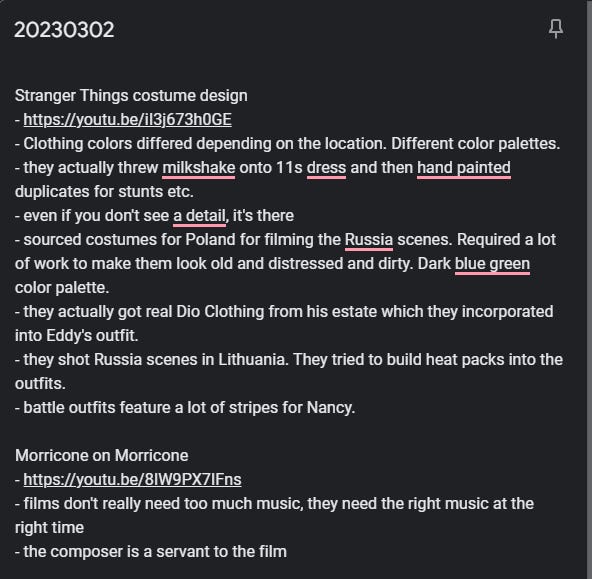How to stay creative - pop your algorithm bubble
A version of this post first appeared in my newsletter. Subscribe to receive posts like this in your inbox every Friday.
My digital algorithm is severely limiting the knowledge I have access to.
Some context:
I read this article by “Circé Creates”: We need to pop our bubble — a guide to find freedom online.
In it, Circé describes the algorithm bubble:
The algorithm bubble happens in the parts of your digital environment that are controlled by algorithms. And it manifests itself when the algorithm is only serving you with a specific type of content.
While this may sound good on the surface: “Hey gimme lots of content on stuff I like”, in reality too much of the same content will stifle your creativity, the knowledge you’re exposed to, and your sources of inspiration.
So much of the content I consume lately is the same.
I’m really jaded with valueless Twitter threads about how Twitter is a free university or whatever it is. (Twitter in general for me doesn’t provide as much value/entertainment as it once did but that’s a whole other can of worms).
I’m shown the same YouTube videos in my home feed and my “have you seen” feed is ultimately a waste of time for the value it brings me.
All the articles in my Medium feed are the same or focus on the same topics. The chances of stumbling on an interesting article are very slim.
When I think about it, this is all like Confirmation Bias in action. I’m only seeing things that support my viewpoint or things I’m focused on. I’m not seeing things outside of my current focus/interests and I’m definitely not seeing ideas that contradict my current viewpoints, thoughts, and beliefs. It’s easy to slip into this and not realize it.
Here’s a good video that explains this phenomenon:
Circé also describes some helpful ways to “pop your algorithm bubble” including trimming your feed, cleaning up your history, and using the “not interested” button.
I let this idea of popping my algorithm bubble sit in my head for the last few months while I explored it further.
How might we pop our algorithm bubbles and reclaim our digital exploration?
Some advice Circé shares in her piece that resonated with me:
- “Asking people what they are watching and consuming the content they recommend”. Word of mouth is great when it comes to this sort of thing. I watched Curb Your Enthusiasm on the recommendation of a friend and I never would have watched it otherwise. It’s now one of my favorite TV shows.
- “Follow and unfollow as your interest change and grow”. It’s important to remember your interests change over time so be liberal with follow/unfollow.
- “I like searching for topics by entering keywords I’ve recently learned”. I have a list of research topics I’ve accumulated over time and every so often I’ll spend a few hours going down a Wikipedia/YouTube rabbit hole to see where I end up.
Consume content attentively:
I bring up this piece from David Hoang almost weekly at this point but there’s so much value to it IMO: Creative consumption - by David Hoang - Proof of Concept
The main take away is the idea of consuming content attentively.
Whenever I listen to a podcast or watch something on TV I’m always on the lookout for that spark of curiosity. I write down things I want to learn more about, things I’ve never heard about, and things I just learned.
All this is added to a list of topics to research. Over time this list becomes my private algorithm of sorts i.e. the things I want to see.
This list is a great way to look beyond the things you’d normally be exposed to.

Look to the past:
“*We have such short memories. You don’t have to go that far back into the past to discover things we’ve already forgotten about. Cracking a book that’s only a quarter of a century old can be like opening a chest of buried treasure. If you want a quick way to escape the noise of contemporary life, break out of your like-minded bubble, and do some good thinking, just visit the past for a bit.” - Austin Kleon
Lots of people get inspiration from people of the past and it certainly would be interesting to dig up content from a world long before the internet.
Here are the steps I’ve taken to pop my algorithm bubble:
I cleaned up my Mailbrew brews including what content I was receiving in each brew. I use Mailbrew to send me a daily digest of all my newsletters and feeds.
I cleared my YouTube history and audited the channels I’m subscribed to.
I cleared my Twitter follows & lists.
I followed more people on Mastodon. Here’s how:
- I followed the advice in this post: @jasongraphix@me.dm
- I used Debirdify to find people I follow on Twitter who also are on Mastodon: Debirdify
- I used this tool to find the people my follows follow: Followgraph for Mastodon
I’m reading more autobiographies and am trying out a new way to find book recommendations:
- I start by reading a book I enjoy
- I read through the bibliography and note down any books that catch my eye.
- Then I read more about the author and see who they enjoy reading or who inspires them.
- Then I look at those people’s books and so on.
My attempt at looking to the past:
- I’ve been surfing through the Open Culture website and have found lots of oddities from the past including the isolator.
- Criterion Collection’s YouTube channel has been a good source of classic movie recommendations.
- Now to find a way to discover old books… might be time to renew my library card.